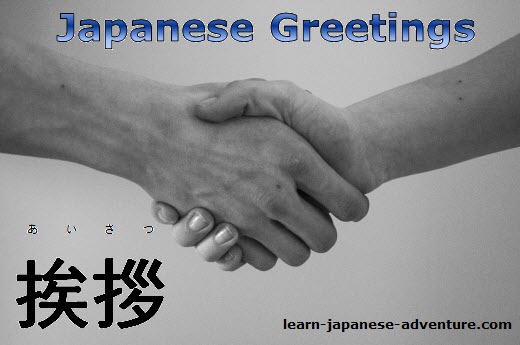- Home
- Basic Lessons
- Japanese Greetings
Basic Japanese Greetings -
Free Japanese Lessons: 1
It is always good to learn some basic Japanese greetings at the start of learning this new language. So over here, I am going to introduce some common Japanese greetings in order to break the ice.

You may not understand the real meaning of each word at this moment. Just give your best shot at memorizing some of them, or all of them, if you can.
In time, you will get to the stage of understanding the meanings of all the words.
At the same time, this may be your first time speaking in Japanese. It may sound weird. But it's fun.
Try it out. Everyone has his or her first time.
Meeting Japanese Friend For The First Time
When meeting a Japanese friend for the first time, the greetings that we will normally say are:
- はじめまして (hajime mashite)
- わたしはジョンです (watashi wa jon desu)
- どうぞ よろしく おねがいします (douzo yoroshiku onegaishimasu)
The meanings for the above 3 sentences are:
- How do you do? (This sentence is used only if you are meeting this person for the first time)
- My name is John. (Assuming your name is John)
- I am pleased to meet you. (Literally the meaning for this sentence is "Please form good relations with me" or "Please take good care of me")
And most likely, your Japanese friend will reply you with:
- こちらこそ (kochira koso)
- どうぞ よろしく おねがいします (douzo yoroshiku onegaishimasu)
- わたしはたなかです (watashi wa tanaka desu)
The meanings are:
- The pleasure is all mine.
- I am pleased to meet you. (Literally the meaning for this sentence is "Please form good relations with me" or "Please take good care of me")
- My name is Tanaka. (Assuming your Japanese friend's name is Tanaka)
Don't be afraid to speak out even though this might be your first time and your pronunciation may sound funny.
Your Japanese friend understands this and may even admire your courage to speak his/her language.
Remember, your will learn a new language only when you begin to speak in that language.
Some Basic Examples of Japanese Greetings
Below are some examples of basic Japanese greetings and phrases using hiragana when I first learned Japanese:
1. おはようございます (ohayou gozaimasu)
Meaning: Good morning
2. こんにちは (konnichiwa)
Meaning: Hello / Good afternoon
3. こんばんは (konbanwa)
Meaning: Good evening
4. さようなら (sayounara)
Meaning: Good bye (This is only used if you are leaving for a long time, such as overseas travel)
5. ありがとうございます (arigatou gozaimasu)
Meaning: Thank you
6. どういたしまして (dou itashimashite)
Meaning: You are welcome / Don't mention it / Not at all
7. すみません (sumimasen)
Meaning: I am sorry / Excuse me
8. ごめんなさい (gomen nasai)
Meaning: I am sorry
9. おやすみなさい (o yasumi nasai)
Meaning: Good night
10. おめでとうございます (omedetou gozaimasu)
Meaning: Congratulations
11. おげんきですか (o genki desu ka)
Meaning: How are you?
12. はい、おかげさまでげんきです (hai, okagesamade genki desu)
Meaning: Yes, due to your kind thoughts, I am very good
13. おなまえは (o namae wa)
Meaning: What is your name?
14. ジョンともうします (Jon to moushimasu)
Meaning: My name is John
15. いただきます (itadakimasu)
Meaning: You say this to express your gratitude before meals
16. ごちそうさまでした (gochisou sama deshita)
Meaning: You say this to express your gratitude after meals
17. おきをつけて (o ki wo tsukete)
Meaning: Please be careful
18. おだいじに (o daiji ni)
Meaning: Take care of your body (say this to friend who is sick)
19. またあした (mata ashita)
Meaning: See you tomorrow
20. ではまた (dewa mata)
Meaning: See you
Still feeling confused? If so, why not try out this simple Japanese course online? It can help you to grasp the concept of Japanese greetings easily and handle more complex questions and answers.
At the same time, it can educate you on many interesting aspects of Japanese culture.
Best Deal of the Year! Get 68% OFF Lifetime Premium! Ends on 13 Dec 2025
Click Here to Get 68% OFF Lifetime Premium and be on the fast track to fluency in Japanese.
The link above is an affiliate link, which means that I would earn a commission (at no extra cost to you) if you do end up purchasing the related learning course.
Next - Lesson 2: Japanese Nouns
Buy me a coffee









Facebook Comments
Don’t see the comments box? Log in to your Facebook account, give Facebook consent, then return to this page and refresh it.